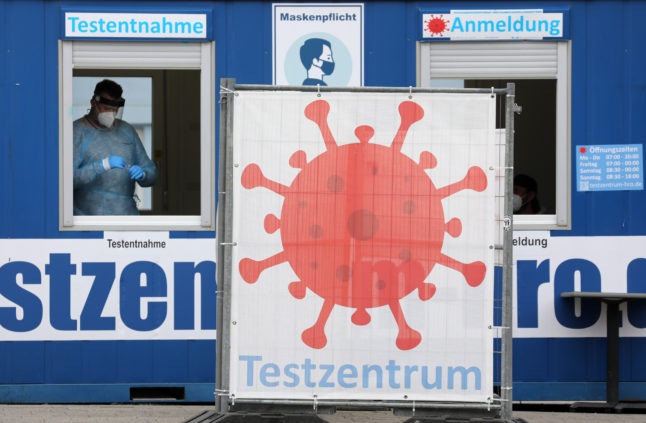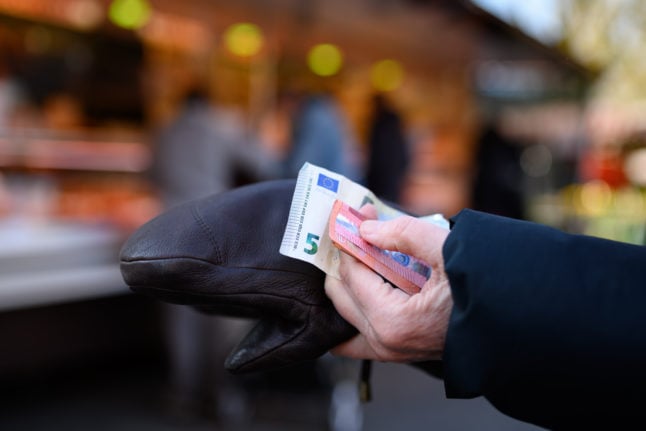Everything that changes in Germany in July 2022

From energy relief measures and an increase in the minimum wage to rules for making it easier to cancel contracts online, here's what's changing in Germany this July.
No more free rapid Covid tests for all
Taxpayer-funded Covid-19 rapid tests or Bürgertests are no longer free for everyone. Under the Health Ministry's plans, the tests will cost €3, however, some groups of people will still get them for free.
READ ALSO:
Financial relief for families
As part of the government's energy relief package, the Kinderbonus will be paid out to families in July. Each child entitled to child benefit will receive a one-time bonus of €100.
Due to inflation and rapidly rising food prices, recipients of social assistance benefits, Hartz-IV and asylum benefits will also get a cash boost in July. They will receive two payments of €100 each and their children €20 each.
€9 ticket and fuel tax cut continues
Germany's €9 monthly public transport ticket offer continues until the end of August so people will be able to buy a ticket and use it in July. Similarly, the fuel tax cut is in force until the end of August.

A Covid test centre in Rostock. Rapid tests will no longer be free for all from July. Photo: picture alliance/dpa | Bernd Wüstneck
End of the EEG levy
The Russian war on Ukraine is causing energy prices to rocket upwards. To help people in Germany deal with the price hikes, the coalition government in Germany has decided to abolish the Renewable Energy Act (EEG) charge.
The EEG levy is a green tax that has been used to fund investment in solar and wind power as part of the energy transition. Until January 1st, 2022, it added 6.5 cents per kilowatt hour to people’s energy bills, but at the start of the year, it was reduced to 3.72 cents per kilowatt hour.
From July people in Germany will no longer have to pay the levy. However, It's not clear whether this will really save consumers much money, due to energy costs going up significantly.
READ ALSO: Will German energy bills really come down soon?
Increase in the minimum wage
As Chancellor Olaf Scholz of the Social Democrats promised before the German federal election last year, the minimum wage is being raised this year. It is to be gradually increased to €12 by October 2022. In January the minimum wage rose to €9.82, in July it will rise to €10.45.

More financial relief measures come into force in Germany in July. Photo: picture alliance/dpa | Jonas Walzberg
Pension increase
People who receive pensions in Germany will get more money from July. In the states that formerly comprised West Germany, pensions will rise by 5.35 percent, in the former East German states by 6.12 percent. The German pension insurance fund says it is one of the highest adjustments since the introduction of pension insurance.
School holidays continue
More schools in German states are finishing up for the summer. After schools in North Rhine-Westphalia broke up in June, Schleswig-Holstein and Mecklenburg-Western Pomerania are next, followed by Hamburg, Berlin and Brandenburg on the Wednesday after (July 6th).
The southern states of Baden-Württemberg and Bavaria will be the last to go off on their school holidays – at the end of July and on August 1st respectively.
Pfand scheme extended
From July, a 25-cent deposit or Pfand will be charged on more plastic bottles and drink cans. Due to the amendment of the Packaging Act, bottled fruit drinks such as orange juice as well as mixed alcoholic beverages will have to be recycled in future. Under plans to extend the scheme further, milk is set to be charged a Pfand from 2024.
The regulation has been in effect since January 2022, but retailers were granted a transitional period until July 2022 to implement the change.
Get rid of old electrical appliances
From July, many large supermarkets and discount chains - including Aldi, Rewe and Edeka - will accept old electrical goods. People will be able to hand in products such as old mobile phones, electric razors, kettles and toasters free of charge.

A kettle stands in a kitchen. Get rid of your old appliances at German supermarkets soon. Photo: picture alliance/dpa/dpa-tmn | Andrea Warnecke
Driving licence deadline approaching
German people born between 1953 and 1958 and who have a paper driving licence issued before 1999 have to exchange it for a digital one or face a warning fine. The deadline for the exchange was originally planned for January, but due to the pandemic, it was extended to July 19th.
The cost of the exchange is €25.50. To apply for the EU driving licence, a valid identity card, the old driving licence and a biometric passport photo is needed. There is no extra driving or health test involved.
READ ALSO: Drivers in Germany given extension to exchange driving licence
New rent law comes into force
As of July, tenants and landlords will have to provide information on rental prices if they are asked to by authorities. This is to enable a comparison of rents, especially in large cities. Tenants and landlords will be selected at random. Those who refuse to provide information can face a fine of up to €5,000.
Extension of tobacco tax
At the start of 2022, tobacco tax was increased and the price of cigarettes went up. As of July, this also applies to shisha tobacco and liquids for e-cigarettes.
Cancellations of contracts online to become easier
Since the beginning of the year, consumers in Germany have been able to terminate rolling contracts more easily. And people who have concluded a contract online should also be able to terminate it online in future under new laws.
From July onwards, firms have to include a cancellation button on websites where contracts can be concluded. If this is not the case, the consumer has the right to terminate the contract without notice.
READ ALSO: How Germany is making it easier to cancel contracts
Cost of sending packages goes up
Anyone who wants to send parcels or packages with DHL from July onwards will unfortunately have to dig further into their pockets. The rises apply to domestic and international shipments. DHL said the price hikes are because of the rise in transport, delivery and labour costs.
READ ALSO: What to know about German parcel delivery hikes
Tax deadline extended
One last point - self-submitted tax returns in Germany were due to be sent to the tax office by the end of July. However, the deadline has been extended until the end of October, giving people more time.
READ ALSO: Why people in Germany have longer to do their tax return this year
Comments (1)
See Also
No more free rapid Covid tests for all
Taxpayer-funded Covid-19 rapid tests or Bürgertests are no longer free for everyone. Under the Health Ministry's plans, the tests will cost €3, however, some groups of people will still get them for free.
READ ALSO:
Financial relief for families
As part of the government's energy relief package, the Kinderbonus will be paid out to families in July. Each child entitled to child benefit will receive a one-time bonus of €100.
Due to inflation and rapidly rising food prices, recipients of social assistance benefits, Hartz-IV and asylum benefits will also get a cash boost in July. They will receive two payments of €100 each and their children €20 each.
€9 ticket and fuel tax cut continues
Germany's €9 monthly public transport ticket offer continues until the end of August so people will be able to buy a ticket and use it in July. Similarly, the fuel tax cut is in force until the end of August.

End of the EEG levy
The Russian war on Ukraine is causing energy prices to rocket upwards. To help people in Germany deal with the price hikes, the coalition government in Germany has decided to abolish the Renewable Energy Act (EEG) charge.
The EEG levy is a green tax that has been used to fund investment in solar and wind power as part of the energy transition. Until January 1st, 2022, it added 6.5 cents per kilowatt hour to people’s energy bills, but at the start of the year, it was reduced to 3.72 cents per kilowatt hour.
From July people in Germany will no longer have to pay the levy. However, It's not clear whether this will really save consumers much money, due to energy costs going up significantly.
READ ALSO: Will German energy bills really come down soon?
Increase in the minimum wage
As Chancellor Olaf Scholz of the Social Democrats promised before the German federal election last year, the minimum wage is being raised this year. It is to be gradually increased to €12 by October 2022. In January the minimum wage rose to €9.82, in July it will rise to €10.45.

Pension increase
People who receive pensions in Germany will get more money from July. In the states that formerly comprised West Germany, pensions will rise by 5.35 percent, in the former East German states by 6.12 percent. The German pension insurance fund says it is one of the highest adjustments since the introduction of pension insurance.
School holidays continue
More schools in German states are finishing up for the summer. After schools in North Rhine-Westphalia broke up in June, Schleswig-Holstein and Mecklenburg-Western Pomerania are next, followed by Hamburg, Berlin and Brandenburg on the Wednesday after (July 6th).
The southern states of Baden-Württemberg and Bavaria will be the last to go off on their school holidays – at the end of July and on August 1st respectively.
Pfand scheme extended
From July, a 25-cent deposit or Pfand will be charged on more plastic bottles and drink cans. Due to the amendment of the Packaging Act, bottled fruit drinks such as orange juice as well as mixed alcoholic beverages will have to be recycled in future. Under plans to extend the scheme further, milk is set to be charged a Pfand from 2024.
The regulation has been in effect since January 2022, but retailers were granted a transitional period until July 2022 to implement the change.
Get rid of old electrical appliances
From July, many large supermarkets and discount chains - including Aldi, Rewe and Edeka - will accept old electrical goods. People will be able to hand in products such as old mobile phones, electric razors, kettles and toasters free of charge.

Driving licence deadline approaching
German people born between 1953 and 1958 and who have a paper driving licence issued before 1999 have to exchange it for a digital one or face a warning fine. The deadline for the exchange was originally planned for January, but due to the pandemic, it was extended to July 19th.
The cost of the exchange is €25.50. To apply for the EU driving licence, a valid identity card, the old driving licence and a biometric passport photo is needed. There is no extra driving or health test involved.
READ ALSO: Drivers in Germany given extension to exchange driving licence
New rent law comes into force
As of July, tenants and landlords will have to provide information on rental prices if they are asked to by authorities. This is to enable a comparison of rents, especially in large cities. Tenants and landlords will be selected at random. Those who refuse to provide information can face a fine of up to €5,000.
Extension of tobacco tax
At the start of 2022, tobacco tax was increased and the price of cigarettes went up. As of July, this also applies to shisha tobacco and liquids for e-cigarettes.
Cancellations of contracts online to become easier
Since the beginning of the year, consumers in Germany have been able to terminate rolling contracts more easily. And people who have concluded a contract online should also be able to terminate it online in future under new laws.
From July onwards, firms have to include a cancellation button on websites where contracts can be concluded. If this is not the case, the consumer has the right to terminate the contract without notice.
READ ALSO: How Germany is making it easier to cancel contracts
Cost of sending packages goes up
Anyone who wants to send parcels or packages with DHL from July onwards will unfortunately have to dig further into their pockets. The rises apply to domestic and international shipments. DHL said the price hikes are because of the rise in transport, delivery and labour costs.
READ ALSO: What to know about German parcel delivery hikes
Tax deadline extended
One last point - self-submitted tax returns in Germany were due to be sent to the tax office by the end of July. However, the deadline has been extended until the end of October, giving people more time.
READ ALSO: Why people in Germany have longer to do their tax return this year
Join the conversation in our comments section below. Share your own views and experience and if you have a question or suggestion for our journalists then email us at [email protected].
Please keep comments civil, constructive and on topic – and make sure to read our terms of use before getting involved.
Please log in here to leave a comment.